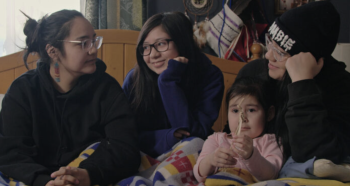Image Caption
Local Journalism Initiative Reporter
Windspeaker.com
It took about four times longer for director Kim O’Bomsawin than she had originally planned to complete her latest film.
But as it turned out, O’Bomsawin, a member of Abenaki First Nation is more than happy now with the delays she experienced while filming Ninan Auassat: We, the Children.
The documentary’s world premiere is set for Oct. 4 at the Vancouver International Film Festival (VIFF).
A second VIFF screening will be held on Oct. 6.
Even before being screened to the public for the first time, the movie had become an award-winning one.
VIFF officials selected Ninan Auassat: We, the Children as the festival’s Best Canadian Documentary. The award includes a $15,000 cash prize.
Ninan Auassat: We, the Children tells the inspiring stories of three groups of youth, who represent three Indigenous Nations - Atikamekw, Eeyou Cree and Innu.
“I thought at first that I would be filming over about a year and a half,” O’Bomsawin said. “And then it extended naturally because of the stories just a bit. And then I thought we were almost done and then COVID happened.”
The pandemic had a significant impact on filming.
“I had to stop for two years,” O’Bomsawin said. “And I had conclusions left to do with my stories. So that was a big surprise. But actually, it was a good payout because the kids grew up so much.”
By the sixth and final year of filming, some of the youth featured in the film had become parents themselves.
“It was pretty cool to see them over such a long period of time,” O’Bomsawin said. “It did work out a lot better,” she said. “I guess my first ambition was to film over a year or so and to capture the beginning and end of something, so let’s say like the first year of high school and the graduation would be the end of one story. In the end it was pretty much the same idea but over a way longer period.”
O’Bomsawin said her intentions all along were to work with teenagers and not have adults speaking on their behalf. She felt the film would be more impactful to have the youth telling their own stories.
“That’s why I wanted to do this film in the beginning because to me the teenagers in our (Indigenous) communities are way more mature,” O’Bomsawin said. “They have been through much more than some kids in the city who are privileged by life and they haven’t gone through many struggles. Not that I wish those struggles to anybody. But when there is a life of struggles at some point you’ve seen a lot so you have a lot to talk about.”
O’Bomsawin was rather keen to get their messages out and have the voices of the youth heard.
“That is the reason why I wanted to do this film,” she said. “I wanted to showcase these kids to tell the world ‘Look, they’re not just bad kids doing drugs and finishing high school.’ They’re actually amazing and brilliant. And they know what the problem is and how to fix it. If we were to listen more closely to them, we would have so much to learn.”
O’Bomsawin added she believes messages in the film became more impactful because of the length of time it took to complete it. She also said that because they became young adults some of those featured in the documentary changed their thinking and their way of viewing the world while also having a better understanding of their own culture.
“When they have kids of their own, then they truly understand why it’s important to know where you’re from and to keep proud of it,” she said.
O’Bomsawin, who is 41 and lives in Montreal, believes one of the key messages in the film is that adults can indeed learn so much themselves by listening to younger generations.
“I think it’s a feel-good movie, with some dark parts of course,” she said. “But I really hope in the end viewers will have learned from kids and always remember we have so much to learn as adults and that we should trust our kids more to teach us stuff in life.”

